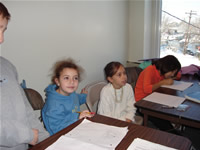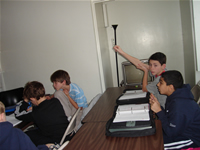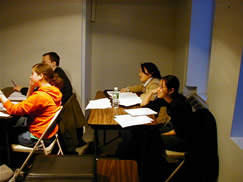Math
Curricula
Grades 2-3

Grades 4-5

Grades 6-9

Grades 10-12





We offer a free evaluation session to assess your level and establish your goals. Then, we fill the gaps in your basic skills and complete your toolbox of SAT-specific strategies. Most students show significant improvement. If you are disciplined and ambitious, we will bring you close to a perfect score. In our school, every teacher is highly qualified and experienced in his or her subject. We can schedule individual tutoring on an as-needed basis. Groups are selected depending on your level and goals, and never have more than eight students, ensuring individual attention is provided for each student. Our program includes homework and SMART internet help between sessions.
by Alexander Shilmover (M.S. in Math from Moscow State University, lifelong experience teaching Math)
Our math programs are designed to fill the gap between the requirements reflected in the recommendations of the Curriculum and Evaluation Standards for School Mathematics made by the National Council of Teachers of Mathematics (NCTM) in 1989, and the existing practices in most of public schools. Some of the shortcomings of current practices are the tendencies to focus on the acquisition of memorization skills; to cover many topics superficially; and to be highly repetitive without in-depth learning.
Nearly every subject has a shadow, or imitation. One can learn imitation history – kings and dates without the slightest idea of the motives behind it all; or imitation literature – stacks of notes on Shakespeare’s phrases, yet a complete lack of power to enjoy Shakespeare. Many traditional programs and textbooks reflect disconnected orientation, focusing on the end results, omitting the important notion of the process, the association between different topics and concepts.
The result is often a feeling of dissatisfaction and even a fear of math, a notion that mathematicians are a race apart, and a feeling by the students that they will never be able to understand math. We are convinced that these perceptions do not lie in the nature of the subject, but, rather, are caused by the poor tradition of teaching math.
The fear of mathematics is a tradition handed down from the days when the majority of teachers knew little about human nature and nothing about the nature of mathematics at all.
— Walter Sawyer
So, what do we emphasize in our programs? We emphasize mathematics as a language; mathematical reasoning and proof, which includes true comprehension of the differences between theorems and definitions; and, ultimately, the ability to draw logical conclusions, making and testing scientific conjectures. When a student realizes that he actually deals with the same phenomena when he looks at things from various perspectives, the fear of math is replaced with the pleasure that comes with deep understanding.
To master anything requires effort. But it does not require unpleasant effort, drudgery. The main task of any teacher is to make a subject interesting.
— Walter Sawyer
We are passionate about teaching our students to communicate and express mathematical ideas coherently. We want to instill the ability in each and every student to listen to himself or herself, to become aware of the way he or she is thinking. We emphasize the idea that math is a language, and therefore, using verbal and symbolic ways, each person learns to express it.
Our Russian background and the traditions of the Department of Mathematics and Mechanics of Moscow University is reflected somewhat in the school curriculum and the selection of permanent and guest teachers, but the philosophy of the school is defined in the first part of this proposal and is very much in the spirit of the new approach developed in the Curriculum and Evaluation Standards for school mathematics, and MCAS requirements.